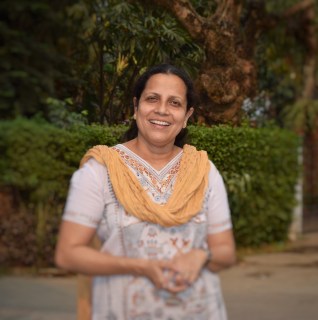(Guwahati) “I work in the social justice sector. I started my career in a women’s rights organisation and have continued to work there for the last 17 years. As of now I am responsible for different kinds of tasks in the organization including management-related work. My focus area is on gender-based discrimination and violence against women, especially, issues like domestic violence, witch hunting, and sexual harassment at the workplace.
In the 1970s and early 1980s, everyone including women in our family, were volunteering for the Assam movement led by the student leaders. I was also taken for these “raasta roko” and “rail roko” protests to assert our rights. Also, I saw this culture of volunteering. In my family, my aunt, grandmother and my mother volunteered for women’s societies and gave vocational trainings on sewing and knitting or making of pickles and jams. I knew I wanted to work on women related issues beyond these vocational trainings.
When I was a student, I had to visit a lot of villages in Assam as part of my course. I would walk into people’s homes and talk to the women. I would ask them questions like: Do you like to work? What are the barriers that doesn’t allow you to work? Why don’t you enjoy your work? A lot of women would respond that given an opportunity, they would like to work outside their household and some others would state that they were allowed to work but they were not allowed to enjoy income from their work. At that point of time, my understanding of women’s rights was not so organized, and I would just simply phrase it as women were not so empowered.
During the course of my study, I met a group of women’s rights activist led by Ben Mahi (Monisha Behl). They would organize talks and seminars and this was a platform which allowed me to raise certain issues which impacted the women in the villages. Gradually, I got insights into a lot of issues of regarding gender, law and feminism.
When I started working 17 years ago, the conflict in Assam was at its peak and we were working in the villages. The para-military forces would come and question us and throw away our files. Once I was taking a group of women to visit a village. A bandh had been called on that day but we did not get the information in the village and so we went out. The para-military forces, which were patrolling the highways, asked all the woman to get out from the vehicle, and get in their vehicles. Some of the tactics of these para-military forces were to threaten women of a particular community to subdue the entire community. We were stranded, interrogated, and were not allowed to move on. Those were stressful times but we stayed in the village and continued our work.
During one of the worst conflict in Kokrajhar, I went there without telling my family. I still remember that one of the sisters from a Convent, who was helping us in our work, informed me that the situation was very tense, and it would be better if she went on her own to help the affected tribal community. But I was firm that if the situation was bad, then it was equally bad for everyone and we finally went together to distribute relief material to the tribal community. It was a challenge to reach out to people and then to come back to do your reporting and advocacy accordingly. These were a few instances of the challenges that I faced earlier on in my work. You have to believe in yourself and trust the people you work with.
Recently, we did a study on domestic violence in rural Assam. The idea was to document cases of domestic violence to do away with the myth that women in rural Assam are free from domestic abuses. We documented the worst forms of physical and sexual abuse. Our objective was to bring the focus of the government to this report and implement certain recommendations for women’s safety within the household. We mobilize women and provide them with legal information, for example, what are the new laws that have been implemented and what can they do in a situation of distress and abuse? A half-an-hour talk empowers 100 women with latest information and it equips them with new skills.
When people argue that “women misuse law”, I ask them what makes them think that. Let us assume that women misuse the law. Who doesn’t misuse the law? Man? Which law is not being misused: AFSPA? I can go on and on. There are other typical misconceptions like women are women’s enemies.”
“There are some funny moments too. For instance, once while I was traveling to Kohima, I slept off and missed my stop and reached Manipur. People in the border area of Manipur were all happy to see two girls. Another time, I went for a fashion show and a journalist, who covers stories and events for my organisation, saw me in my outrageously colourful outfit and asked me in shock “You are here!”. Somehow, he could’t believe that I was attending a fashion show. I often go to fashion shows and concerts and I take my child for plays. After 5 p.m. my priority is my daughter.
For a working women, it is a challenge to balance home and work. But first, one just needs to enjoy work and second learn to prioritize. Identify what is the priority now and learn to say “no”, whether at the workplace or in personal life. Today I have a supportive family. My husband and daughter take charge of family chores when I am traveling. I discover new things in life every second. I am still growing.”


keep up the good work we are proud of you
You are a very intelligent and determined woman. Women get inspired by your motivational work. Wishing you the best.
Agree